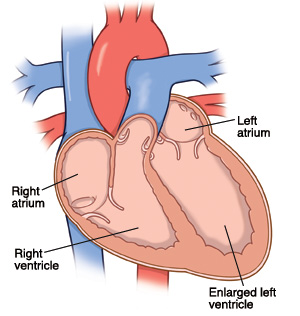The heart is a large muscle that pumps blood throughout the body. Blood carries oxygen to all the organs including the brain, plus the muscles and skin. After the body takes the oxygen out of the blood, the blood returns to the heart. The right side of the heart collects that blood. It pumps the blood to the lungs to get fresh oxygen. This oxygen-rich blood from the lungs then returns to the left side of the heart. There it's pumped back out to the brain and the rest of the body, starting the process all over.
Heart failure occurs when the heart muscle does not work correctly. This causes your body to retain fluids and reduces blood flow. This can be caused by heart muscle weakness, stiffness, or a heart valve problem.
When the left side of the heart is failing, it can’t handle the blood it's getting from the lungs. Pressure then builds up in the veins of the lungs, causing fluid to leak into the lung tissues. This may be referred to as congestive heart failure. As a result, you may feel short of breath, weak, or dizzy. These symptoms are often worse with physical activity, such as climbing stairs or walking up hills. Lying flat is uncomfortable and can make your breathing worse. You may have trouble sleeping. You may need to use extra pillows to raise your upper body to help you sleep well. You may also feel weak or tired and have less energy during activities.
Causes of heart failure include:
-
Coronary artery disease
-
Heart attack (myocardial infarction or AMI) in the past
-
High blood pressure
-
Damaged heart valve
-
Diabetes
-
Obesity
-
Alcohol abuse
-
Illegal drug use, such as methamphetamine
-
Inflammatory conditions including infection
-
Genetic factors
-
Pregnancy
Treatment
Heart failure is usually a long-term (chronic) condition. The purpose of treatment is to improve the pumping action of the heart and remove extra water and fluids from the body. A number of medicines can help. They can improve symptoms and keep the heart from becoming weaker. Cardiac procedures and surgery may help certain conditions that cause heart failure. In some cases of severe heart failure, a mechanical device can be placed in the heart to help the heart pump. A heart transplant is another choice. Another major goal is to better treat the causes of heart failure, such as diabetes, high blood pressure, and your lifestyle.
Home care
-
Check your weight every day. A sudden increase in weight gain could mean heart failure is getting worse.
-
Use the same scale every day.
-
Weigh yourself at the same time every day. Wear similar clothing or no clothes at all.
-
Make sure the scale is on the floor, not on a rug.
-
Keep a record of your weight every day, so your healthcare provider can see it. If you are not given a log sheet for this, keep a separate journal for this purpose.
-
-
Cut back on how much salt (sodium) you eat:
-
Your provider will tell you how much salt to have daily. This is usually 1,500 mg or less.
-
Limit high-salt foods. These include olives, pickles, smoked meats, processed foods, and salted potato chips.
-
Don't add salt to your food at the table. Use only small amounts of salt when cooking.
-
Don't binge on salt-heavy meals.
-
-
Improve your diet. Often in the hospital, people are given a heart healthy diet. This includes eating more fresh foods and cutting back on saturated fat, processed foods, and salt.
-
Follow your healthcare provider's advice about how much fluid you should have.
-
Stop smoking, if you smoke.
-
Don't use illegal drugs.
-
Limit the amount of alcohol you drink.
-
Lose weight if you are overweight. The extra weight puts a lot of stress on the heart.
-
Stay active. Talk with your provider about an exercise program that is safe for your heart.
-
Keep your feet elevated to reduce swelling. Ask your provider about support hose to help prevent daytime leg swelling.
-
Follow your healthcare provider's instructions closely.
Follow-up care
Follow up with your healthcare provider, or as advised. Make sure to keep any appointments that were made for you. This can help better control heart failure.
If an X-ray was done, you will be told of any new findings that may affect your care.
Call 911
Call
-
Become very short of breath
-
Feel dizzy, lightheaded, or like you might pass out or faint
-
Have chest pain or discomfort that is different than usual, the medicines your provider told you to use for this pain don't help, or the pain lasts longer than 10 to 15 minutes
-
Develop a fast or irregular heart rate
When to seek medical advice
Call your healthcare provider right away if you have any of these signs of worsening heart failure:
-
Sudden weight gain. This means more than
2 pounds in 1 day, or5 pounds in 1 week, or whatever weight gain your provider told you to report. -
Trouble breathing not related to being active
-
New or increased swelling of your legs or ankles
-
Swelling or pain in your abdomen
-
Breathing trouble at night, waking up short of breath, or needing more pillows to elevate your upper body to help you breathe
-
Frequent coughing that doesn’t go away
-
Feeling much more tired than usual



